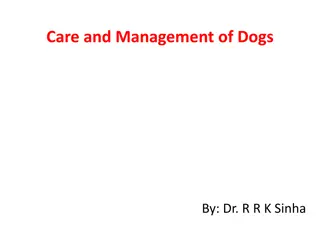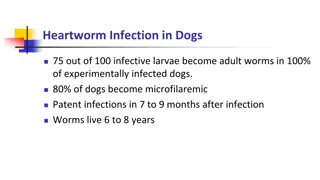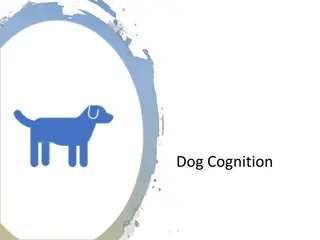Introduction to Ehrlichia and Its Impact on Dogs
Ehrlichia, a genus of bacteria, can cause diseases in dogs such as canine rickettsiosis. This article explores the morphology, transmission, host species, and pathogenesis of Ehrlichia, shedding light on the impact it has on dogs' health. Understanding these aspects is crucial for veterinarians and pet owners to effectively manage and prevent Ehrlichia infections in canine companions.
Download Presentation

Please find below an Image/Link to download the presentation.
The content on the website is provided AS IS for your information and personal use only. It may not be sold, licensed, or shared on other websites without obtaining consent from the author.If you encounter any issues during the download, it is possible that the publisher has removed the file from their server.
You are allowed to download the files provided on this website for personal or commercial use, subject to the condition that they are used lawfully. All files are the property of their respective owners.
The content on the website is provided AS IS for your information and personal use only. It may not be sold, licensed, or shared on other websites without obtaining consent from the author.
E N D
Presentation Transcript
Bihar Animal Sciences University | Ehrlichia Dr. AJIT KUMAR Dr. AJIT KUMAR HoD HoD Department of Veterinary Parasitology Department of Veterinary Parasitology Bihar Veterinary College Bihar Veterinary College Bihar Animal Sciences University Bihar Animal Sciences University Patna Patna- -800014 800014 Image source: Google image
Order : Order : Rickettsiales Rickettsiales Genus: Genus: Ehrlichia Ehrlichia Morphology: It pleomorphic negative intracytoplasmic inclusion found in circulating leucocytes. is small gram coccoid bodies Image source: Google image
Genus: Genus: Ehrlichia Ehrlichia Morphology: Organisms may occur singly or generally in compact colonies as morula cytoplasm leucocytes. in the of Image source: Google image
Order : Order : Rickettsiales Rickettsiales Genus: Genus: Ehrlichia Ehrlichia Species Species Definitive Definitive host host Location Location V Vector ector Ehrlichia canis Dog Monocyte Rhipicephalus sanguineus (Brown dog tick) Ehrlichia ewingi Dog Neutrophil Ehrlichia chaffeensis Dog and human Monocyte
Genus: Genus: Ehrlichia Ehrlichia Transmission: It is transmitted transtadially by the tick and also through infected blood transfusion. Image source: Google image
Genus: Genus: Ehrlichia Ehrlichia Disease: Ehrlichia canis causes disease in dog known as canine rickettsiosis or tracker dog disease or canine typhus or canine haemorrhagic fever or tropical canine pancytopenia or emerging silent tick born disease of dog or AIDS of the canine world.
Order : Order : Rickettsiales Rickettsiales Genus: Genus: Ehrlichia Ehrlichia Pathogenesis Puppies may remain as carrier for a long time. Stress, depression and concurrent with other infections may disease. immunological precipitate the
Order : Order : Rickettsiales Rickettsiales Genus: Genus: Ehrlichia Ehrlichia symptoms: Symptoms includes undulating temperature, anaemia, polyarthritis, thrombocytopenia thrombocytopenia, , corneal corneal opacity opacity, renal failure, clotting abnormalities leading to epistaxis, haematuria, haematemesis and haemorrhagic diarrhoea.
Ehrlichia Corneal opacity in E. canis infected dog Image source: Google image
Genus: Genus: Ehrlichia Ehrlichia Diagnosis : Microscopic stained blood smear revealed morula stage of Ehrlichia in leucocytes. examination of Ehrlichia found in mixed infection with Babesia canis or Hepatozoon canis. canis commonly Persistence and duration of ehrlichiosis unnoticed by the owner for long time due to variability in clinical signs. is usually Morula of E. canis in monocyte Image source: Google image
Genus: Genus: Ehrlichia Ehrlichia Treatment :- Doxycycline Oxytetracycline are used in treatment of ehrlichiosis. and
Genus: Genus: Ehrlichia Ehrlichia Control :- treatment animals By vector (tick) control of infcetde























